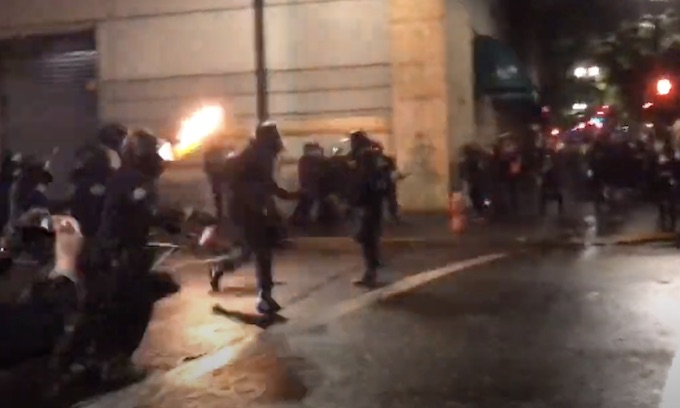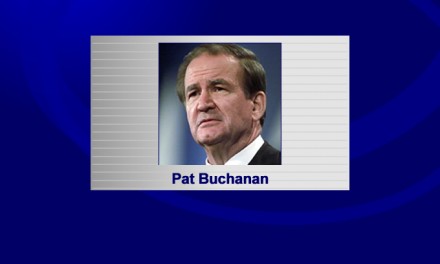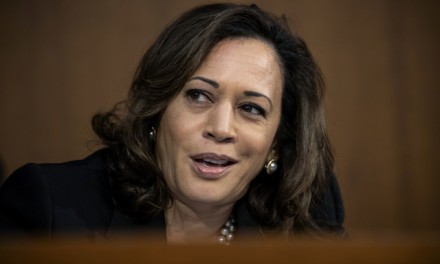That burning Molotov cocktail painted an arc of fire in the Portland night sky on Wednesday, narrowly missing a group of police officers moving toward angry, violent protesters.
The reason this time? A grand jury in Kentucky did not file murder charges against Louisville police officers in the killing of Breonna Taylor.
Perhaps you might ask yourself this:
If that firebomb had hit the police — with some officers burned alive and survivors sent to the tortures of a hospital burn ward — would we say their names?
And if not, then why not?
Protestor throws Molotov at police pic.twitter.com/i3afKRalAT
— Sergio Olmos (@MrOlmos) September 24, 2020
Or what of those two police officers in Louisville who were shot during protests, after news of the grand jury’s decision was made public?
They survived. But if they hadn’t, would we be compelled to say their names?
Many reasonable Americans are asking themselves such questions now. But they wouldn’t dare ask such questions out loud, in public. And that begs even more questions, even though the answers are already known.
So, what is really going on here?
Politics. The Nov. 3 presidential election is just weeks away. And everything is being fed to its flame.
Yes there is legitimate anger over what happened to Taylor, killed when police executed a legal search warrant, announcing themselves after midnight at her home as part of a narcotics investigation of her former boyfriend, ex-con Jamarcus Glover, who was later arrested on drug charges. According to the Kentucky attorney general’s office, Taylor’s current boyfriend heard police at the door and, afraid that it wasn’t police, fired the first shot, wounding one officer in the leg. Officers fired back, and she was killed.
Only one officer was charged, with recklessness, for wantonly shooting into another apartment at the time. But not those who shot Taylor.
Her death is indeed tragic. And it is a mess, and the details of who fired the first shot and the cop at the door being wounded have been downplayed by those determined to push a political narrative. Why? Because they can. Because politics drives everything now.
I happen to be in favor of protests, even angry ones — but not violent ones — when Americans object to what they see as unreasonable use of government force. That is our right as citizens.
But isn’t it also reasonable for citizens to consider their obligations, and think on everything we’ve witnessed for months since the police killing of George Floyd in Minneapolis, and perhaps wonder if it has been leveraged, maliciously, for political purposes?
Is it possible that legitimate demands for justice for Taylor and Floyd have been woven together with illegitimate neo-Marxist shouts for mob revenge against all police, with all that rage framed by chanting slogans that really mean, “No Biden, No Peace”?
I think so. Others of you may disagree. I get that. But it is likely that many Americans see how political motives have blended into the violence. And those who feed the flames, including some pundits who see nothing but race, and celebrity actors playing to the outrage, contribute to the unrest, though they won’t admit it.
They’ll tell you their hands are clean even if cops burn.
When passions are high, it’s difficult to discuss the difference between justice and mob justice, between politically stoked revenge and legitimate outrage over how Black people have been treated by police.
But you can’t hear any discussion against the howl of a mob. Kentucky Attorney General Daniel Cameron, a Republican, the first Black man ever elected to the office in that state, tried. But many didn’t want to listen. He announced the news that the grand jury understood police defended themselves after Taylor’s boyfriend shot first and therefore, the jurors could not indict the cops on murder charges.
“I understand that as a Black man, how painful this is … which is why we did everything we possibly could to uncover every fact. … My heart breaks for the loss of Miss Taylor. And I’ve said that repeatedly.”
But, he added: “If we simply act on emotion or outrage, there is no justice. Mob justice is not justice. Justice sought by violence is not justice. It just becomes revenge.”
He also warned that activists, influencers, sports celebrities and Hollywood types who don’t know the facts of the case “will try to tell us how to feel” and that the reaction of the people would demonstrate what kind of “society we want to be.”
What kind of society? That was demonstrated almost immediately with the Molotov cocktail in Portland and the Louisville cops shot.
And it was demonstrated when Cameron, a thoughtful prosecutor and perhaps someday an appointee to the U.S. Supreme Court, was vilified by some as a race traitor.
Cheryl Dorsey, a retired Los Angeles Police Department sergeant, said as much on left-leaning MSNBC, echoing others.
“Let me just speak to this whole celebrity influencer thing — while, look, they can’t speak for Kentuckians,” Dorsey said. “Let me say this as a Black woman. (Cameron) does not speak for Black folks. He is skin folk, but he is not kinfolk, and so just like he thinks they can’t speak for Kentucky because he’s up there with a Black face, he does not speak for all of us. This was not a tragedy, this was a murder. He should be ashamed of himself.”
There were others who said, wrote and tweeted worse, but their hatred doesn’t grant them mention here, especially now, when anger is the thing and politics is the thing.
And Nov. 3 is just weeks away.
Listen to “The Chicago Way” podcast with John Kass and Jeff Carlin — at www.wgnradio.com/category/wgn-plus/thechicagoway.
Twitter @John_Kass
___
(c)2020 the Chicago Tribune
Visit the Chicago Tribune at www.chicagotribune.com
Distributed by Tribune Content Agency, LLC.


















Recent Comments